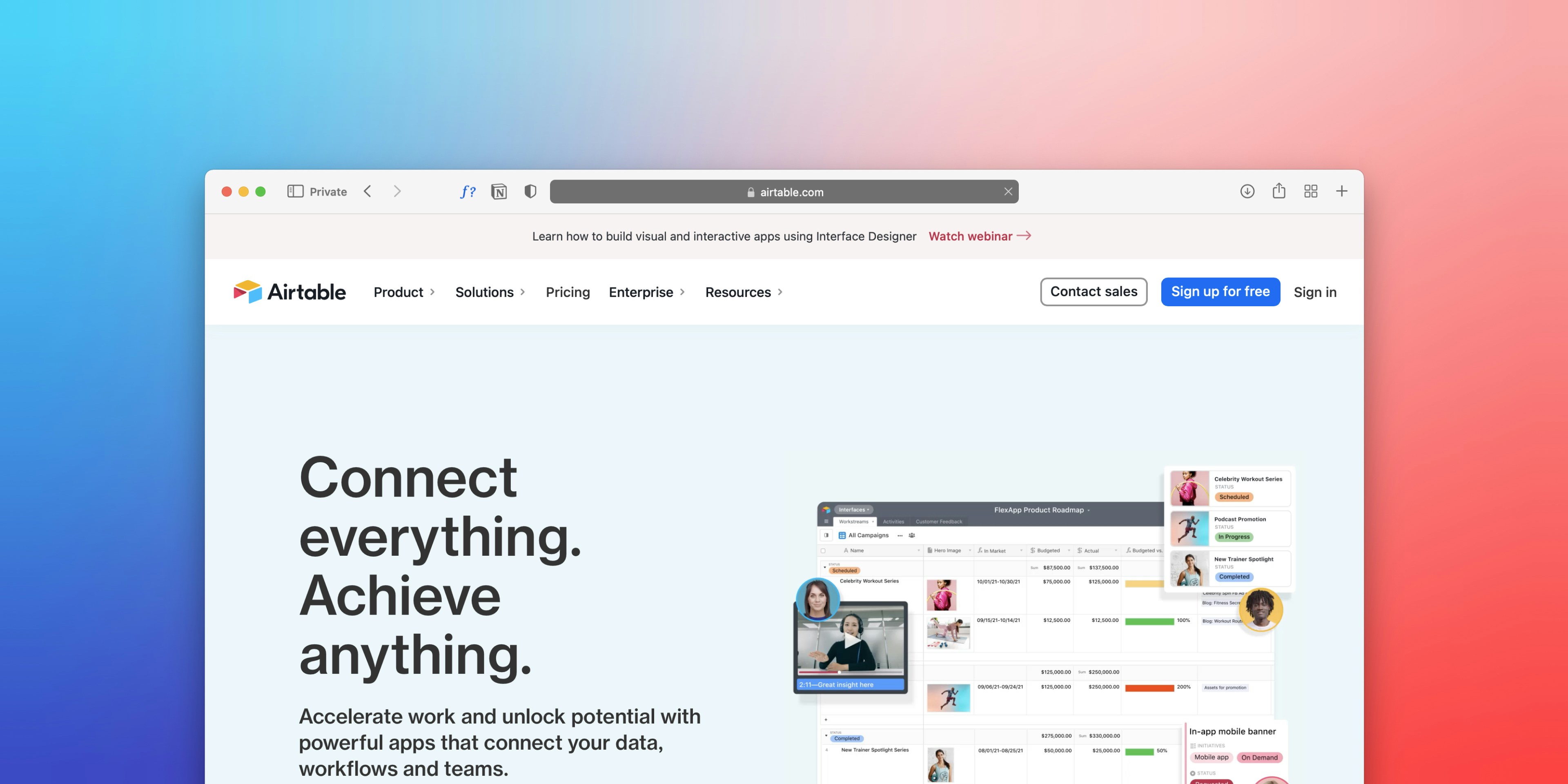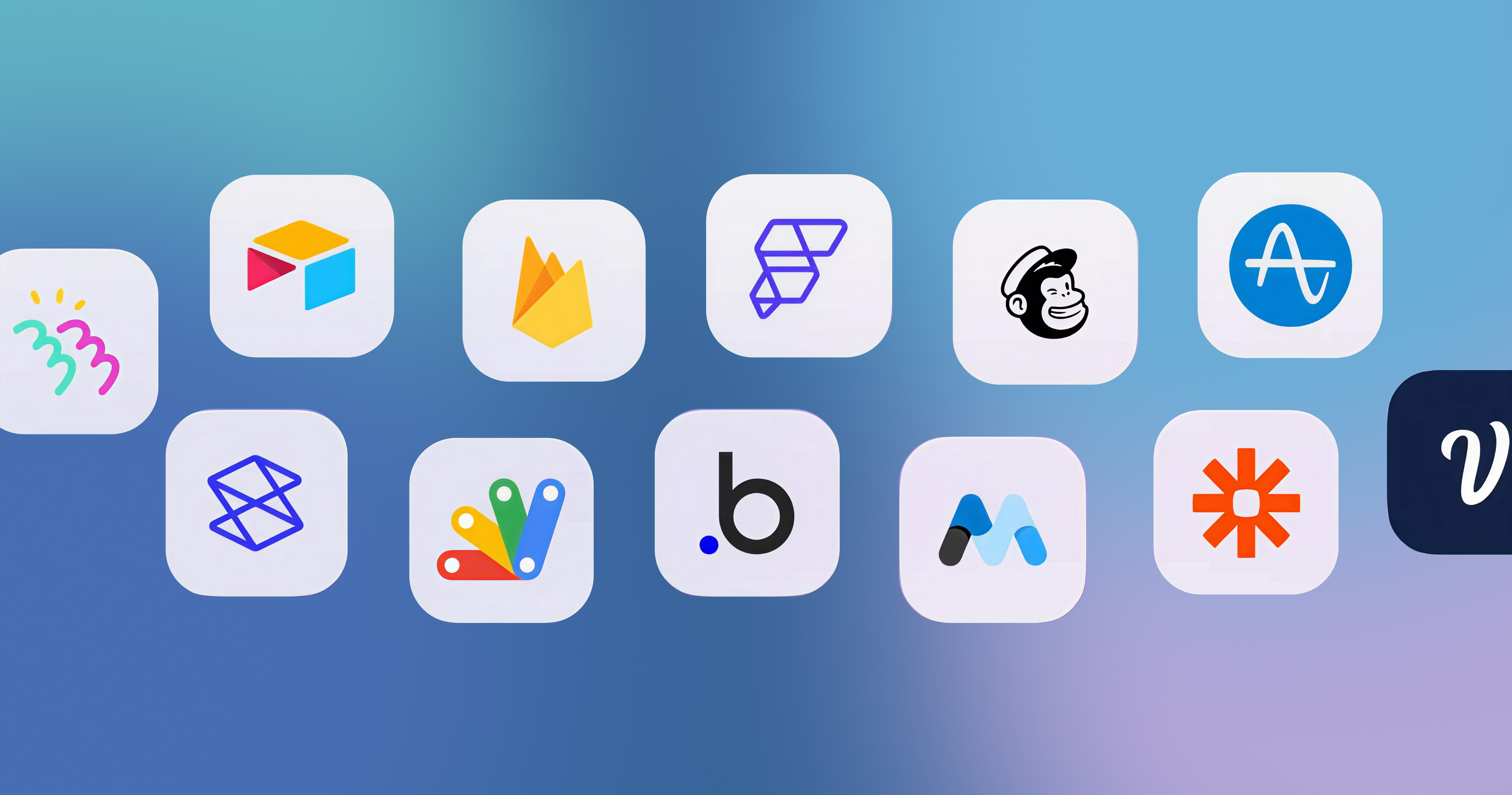-p-2000.png)


Airtable: The Platform to Build Next-Gen Apps

Airtable is an user-friendly platform that allows businesses to design and develop customized applications with minimal to no technical expertise. As a powerful, cloud-based tool, Airtable is great at making data interoperable for all users, regardless of their technical skills.
This tool integrates the ease of spreadsheets with the robust capabilities of relational databases to synchronize, sort, and manage data effectively.
In this blog, we’re going to discuss the features and benefits of Airtable, how it can help transform your business processes, and see how to get started for seamless workflows. Let’s get started!
What Is Airtable?
As we mentioned above, Airtable is a cloud-based, collaborative database that allows businesses and individuals to build custom apps without any hassle. Unlike the old style model, where databases have expertise in data management or SQL requirements, Airtable provides an interface with a grid structure similar to a spreadsheet, making it easy for everyone to use without any coding skills or expertise.
Airtable is used for creating databases, linking records from different tables, and to display data in a number of different ways, such as grids, calendars, or kanban boards. A combination of the best of spreadsheets and Airtable, the tools allow users to manage their data, automate workflows etc., all without any coding skills. Airtable makes organizing and collaborating on data easy, whether you are new to the platform or have years of experience.
What Are the Key Features of Airtable?
Airtable comes with some features that are all designed to improve productivity, collaboration, and data management. Some of the main Airtable features are:
- Customizable Templates
Airtable features a great variety of templates already created for businesses to carry out functions such as project management, content planning, event management, and sales CRM, among others. They are meant to get you up and run within no time and also allow you to customize for your specific requirements. If you're managing projects, planning marketing campaigns, or tracking inventories, Airtable templates will give a fantastic basis for your workflow.
- Collaboration Tools
Airtable makes teamwork with other members through real-time collaborations possible because team members can enable commenting, attachment, and task assignment all within the platform. Changes in Airtable can be made and everyone is up to date with their current situation; additionally, previous versions of your data can be recovered to give you full transparency and prevent snowballing mistakes.
- Integrations and Automations
Airtable integration is possible with different third-party applications such as Slack, Google Drive, Dropbox, Salesforce, and many others. This allows for seamless transfer of data and information between different tools that the team is using. Also, Airtable has set automation in such a way that it can trigger and act on repetitive task automation. Be it sending notifications before a change happens to a task or updating an entry record on specific conditions, Airtable automation eliminates manual work and increases efficiency.
- Multiple Views
With Airtable, you can visualize and interpret your data in many ways like the grid view, calendar view, kanban, gallery, and form view. These are a few examples and given that different views serve different purposes, they enable users to see the data from different perspectives. The marketing team can manage events and campaign scheduling with calendar views while the project manager uses kanban view to keep track of task progress in various completion stages.
- Rich Field Types
A range of field types from text to numbers, attachments to checkboxes, dropdowns to bar codes, is supported by Airtable. This makes it possible to manage virtually all types of data on a single platform well. The attachment field may store images or documents, while with checkboxes you might indicate the status of tasks.
- Mobile Accessibility
Airtable’s mobile apps ensure that teams can access and edit their databases from anywhere. Whether you're on the go or working remotely, Airtable’s mobile interface is optimized for touch interactions, ensuring seamless access to your data no matter where you are.
Advantages of Using Airtable for Businesses
Airtable’s highly functional features are great features that offer benefits from very small to large scale business. Some of them are listed below:
- Flexibility and Customization
Airtable can build very flexible data bases so as to suit the needs of any business starting from stock management, customer feedback, marketing campaigns, etc. Airtable's numerous customizable fields, views, and templates can really bring any business process seamlessly in front of your own requirements for managing information.
- Great Collaboration
Airtable uses a common platform for all data and enables those teams to share and work since they can all converse by adding comments and other tasks to have an up-to-date situation on handling everything. Moreover, tracking changes and keeping version history makes it easier to avoid mistakes and communication mishaps, leading to streamlined operations and better results of projects.
- Automation Saves Time
The automating tools of Airtable save a lot of valuable hours to businesses without requiring a manual update and the boring repeating activities. Take an example of such triggers-you can use it for sending notifications whenever a particular task gets updated or send follow-up emails after the submission of the application. Automation customizable to your team's requirements takes it a level higher in efficiency with less human error.
- Increased Data Visualization Empowerment
The built-in data visualization tools are very powerful so that you can be enlightened with good decision-making using this application. With its several views such as grid, calendar, or kanban, you can easily track your work progress, notice the tendencies, and measure performance. This leads to envisioning data so that one can spot possible bottlenecks and optimise work planning and, hence, strategize in a more effective way.
These ensure scalability as per your increasing business needs as Airtable will grow up with you. Be it small teams to an enterprise with voluminous data and users, Airtable would scale accordingly to provide performance without the usual trade-offs as associated with most traditional business software. Also, it is flexible to be changed as per changing needs in your organization.
You can also read our comparison on Airtable vs Google Sheet?s: Which One is Best?
Some Use Cases of Airtable for Varying Industries
Below are some use-case scenarios on how Airtable is used:
- Marketing
For instance, marketing departments can be given Airtable as a collaborative tool for managing content calendars, tracking the performance of campaigns, and editing exciting projects. It specifically integrates with social media channels for publishing and analytic tracking of marketing initiatives.
- Project Management
Airtable can be a project manager's best friend when it comes to task setup, deadline management, and milestone tracking. A closely linked relationship between tasks, timelines, and all team members can also be viewed in a general way that will help a team see its current project statusing-tracking costs to stay within their budget and on the right track.
- Human Resources
Recruitment, employee onboarding, and performance tracking are activities that could be simplified with Airtable for any HR team. Its customizable forms and workflows allow HR teams to manage applications, and track employee progress. Automations can also be done to follow-up emails or automatically schedule interviews.
- Sales and CRM
Salespersons use Airtable to manage client relationships and track their prospects. The ability to forecast sales would make it easier for an everyday sales user. Integration with other CRMs and the possibility of automation ensures seamless data flow for personalized, tailor-made follow-up.
- Event Planning
Airtable has made it possible for event planners to manage anything and everything about an event-from vendor contracts to guest lists. Linking records such as event venues, schedules, and attendees means all details are kept up to date, thus improving organization and ensuring event success.
Check out our blog on How to Power Your Workflows with Airtable AI.
Getting Started with Airtable
The following are some steps to get started with Airtable:
(Flow chart will be added)
- Get Signup and Customize Your Template
Start the process by creating an Airtable account. Log in and view the nearly endless library of templates available for different use cases like project management, content creation, or CRM. Choose that template which seems most appropriate for you, or make a completely new one from scratch.
- Customize Your Database
Choose your model according to your business. Add, modify, and customize fields so that they are included and can get information relevant for your company. You can also have created relationships among the different tables so that similar information, such as tasks with team members or clients with projects, can be connected.
- Collaboration and Sharing
Let your teammate invite all for collaboration in your Airtable base. Assign some permissions as to who can view, comment, and edit given records to ensure the required level of access is given. Use real time comment and notification features for updates.
- Explore Integrations and Automations
Link Airtable with popular apps such as Slack, Google Drive, Zendesk, and Trello to take advantage of Airtable's full capacity. Automate time-consuming and repetitive tasks such as sending emails or updating records to save time-since Airtable's integration with Zapier opens infinite doors with thousands of other apps.
- Making the Most of the Airtable Community
Airtable has got an active and highly supportive user community that shares really great insights and templates among many other best practices. You can get answers to your questions, learn about breaking features, and find inspired ways of using Airtable for business through forums or participating in user groups.
Conclusion
Airtable is a powerful and versatile platform that combines the ease of spreadsheets with the sophistication of databases, making it an ideal solution for businesses looking to build next-generation applications. Flexibility, customization, collaboration tools, and automation are what will enable enterprises of any size to understand the streamlining of operations, increase productivity, and drive innovation.
Whether you have a small team or you're scaling your business, Airtable is that tool that will keep you organized, efficient, and competitively ahead. If you would like to know more, connect with us now and we allow you to work smarter and take a leap.
FAQs
- How can I use Airtable for efficient project management?
You can easily use Airtable’s customizable templates, collaboration tools, and views like grids and kanban boards to keep track of tasks, deadlines, and milestones. Also, integrating with other apps and automating workflows makes everything run smoother.
- Is Airtable a good product for businesses?
Yes. Airtable is user-friendly and combines the easiness of spreadsheets with the power of databases, making it perfect for managing data and boosting collaboration.
- What’s the best way to use Airtable for my business?
The best way is to customize it to fit your needs. You can use templates and integrations to manage projects, track customer relationships, plan events or do whatever works best for you.
- What are some best use cases for Airtable?
Airtable is great for project management, CRM, marketing, event planning, and HR. It’s super flexible, so you can adapt it to fit pretty much any business need.
- What are the pros and cons of using Airtable as a CRM?
Pros: It’s highly customizable, integrates well with other tools, and helps automate tasks.
Cons: There might be a bit of a learning curve, especially if you’re dealing with a lot of data or advanced features.
- What’s your opinion about Airtable’s functionality?
Airtable is versatile, powerful, and makes managing data and automating tasks easy for businesses of all sizes.
- Can Airtable work for both small and large businesses?
Yes. Airtable is scalable, so it works just as well for small teams as it does for large enterprises, adapting to your growing data and user needs.

FAQ
Marketing Team
Publisher
Airtable is an user-friendly platform that allows businesses to design and develop customized applications with minimal to no technical expertise. As a powerful, cloud-based tool, Airtable is great at making data interoperable for all users, regardless of their technical skills.
This tool integrates the ease of spreadsheets with the robust capabilities of relational databases to synchronize, sort, and manage data effectively.
In this blog, we’re going to discuss the features and benefits of Airtable, how it can help transform your business processes, and see how to get started for seamless workflows. Let’s get started!
What Is Airtable?
As we mentioned above, Airtable is a cloud-based, collaborative database that allows businesses and individuals to build custom apps without any hassle. Unlike the old style model, where databases have expertise in data management or SQL requirements, Airtable provides an interface with a grid structure similar to a spreadsheet, making it easy for everyone to use without any coding skills or expertise.
Airtable is used for creating databases, linking records from different tables, and to display data in a number of different ways, such as grids, calendars, or kanban boards. A combination of the best of spreadsheets and Airtable, the tools allow users to manage their data, automate workflows etc., all without any coding skills. Airtable makes organizing and collaborating on data easy, whether you are new to the platform or have years of experience.
What Are the Key Features of Airtable?
Airtable comes with some features that are all designed to improve productivity, collaboration, and data management. Some of the main Airtable features are:
- Customizable Templates
Airtable features a great variety of templates already created for businesses to carry out functions such as project management, content planning, event management, and sales CRM, among others. They are meant to get you up and run within no time and also allow you to customize for your specific requirements. If you're managing projects, planning marketing campaigns, or tracking inventories, Airtable templates will give a fantastic basis for your workflow.
- Collaboration Tools
Airtable makes teamwork with other members through real-time collaborations possible because team members can enable commenting, attachment, and task assignment all within the platform. Changes in Airtable can be made and everyone is up to date with their current situation; additionally, previous versions of your data can be recovered to give you full transparency and prevent snowballing mistakes.
- Integrations and Automations
Airtable integration is possible with different third-party applications such as Slack, Google Drive, Dropbox, Salesforce, and many others. This allows for seamless transfer of data and information between different tools that the team is using. Also, Airtable has set automation in such a way that it can trigger and act on repetitive task automation. Be it sending notifications before a change happens to a task or updating an entry record on specific conditions, Airtable automation eliminates manual work and increases efficiency.
- Multiple Views
With Airtable, you can visualize and interpret your data in many ways like the grid view, calendar view, kanban, gallery, and form view. These are a few examples and given that different views serve different purposes, they enable users to see the data from different perspectives. The marketing team can manage events and campaign scheduling with calendar views while the project manager uses kanban view to keep track of task progress in various completion stages.
- Rich Field Types
A range of field types from text to numbers, attachments to checkboxes, dropdowns to bar codes, is supported by Airtable. This makes it possible to manage virtually all types of data on a single platform well. The attachment field may store images or documents, while with checkboxes you might indicate the status of tasks.
- Mobile Accessibility
Airtable’s mobile apps ensure that teams can access and edit their databases from anywhere. Whether you're on the go or working remotely, Airtable’s mobile interface is optimized for touch interactions, ensuring seamless access to your data no matter where you are.
Advantages of Using Airtable for Businesses
Airtable’s highly functional features are great features that offer benefits from very small to large scale business. Some of them are listed below:
- Flexibility and Customization
Airtable can build very flexible data bases so as to suit the needs of any business starting from stock management, customer feedback, marketing campaigns, etc. Airtable's numerous customizable fields, views, and templates can really bring any business process seamlessly in front of your own requirements for managing information.
- Great Collaboration
Airtable uses a common platform for all data and enables those teams to share and work since they can all converse by adding comments and other tasks to have an up-to-date situation on handling everything. Moreover, tracking changes and keeping version history makes it easier to avoid mistakes and communication mishaps, leading to streamlined operations and better results of projects.
- Automation Saves Time
The automating tools of Airtable save a lot of valuable hours to businesses without requiring a manual update and the boring repeating activities. Take an example of such triggers-you can use it for sending notifications whenever a particular task gets updated or send follow-up emails after the submission of the application. Automation customizable to your team's requirements takes it a level higher in efficiency with less human error.
- Increased Data Visualization Empowerment
The built-in data visualization tools are very powerful so that you can be enlightened with good decision-making using this application. With its several views such as grid, calendar, or kanban, you can easily track your work progress, notice the tendencies, and measure performance. This leads to envisioning data so that one can spot possible bottlenecks and optimise work planning and, hence, strategize in a more effective way.
These ensure scalability as per your increasing business needs as Airtable will grow up with you. Be it small teams to an enterprise with voluminous data and users, Airtable would scale accordingly to provide performance without the usual trade-offs as associated with most traditional business software. Also, it is flexible to be changed as per changing needs in your organization.
You can also read our comparison on Airtable vs Google Sheet?s: Which One is Best?
Some Use Cases of Airtable for Varying Industries
Below are some use-case scenarios on how Airtable is used:
- Marketing
For instance, marketing departments can be given Airtable as a collaborative tool for managing content calendars, tracking the performance of campaigns, and editing exciting projects. It specifically integrates with social media channels for publishing and analytic tracking of marketing initiatives.
- Project Management
Airtable can be a project manager's best friend when it comes to task setup, deadline management, and milestone tracking. A closely linked relationship between tasks, timelines, and all team members can also be viewed in a general way that will help a team see its current project statusing-tracking costs to stay within their budget and on the right track.
- Human Resources
Recruitment, employee onboarding, and performance tracking are activities that could be simplified with Airtable for any HR team. Its customizable forms and workflows allow HR teams to manage applications, and track employee progress. Automations can also be done to follow-up emails or automatically schedule interviews.
- Sales and CRM
Salespersons use Airtable to manage client relationships and track their prospects. The ability to forecast sales would make it easier for an everyday sales user. Integration with other CRMs and the possibility of automation ensures seamless data flow for personalized, tailor-made follow-up.
- Event Planning
Airtable has made it possible for event planners to manage anything and everything about an event-from vendor contracts to guest lists. Linking records such as event venues, schedules, and attendees means all details are kept up to date, thus improving organization and ensuring event success.
Check out our blog on How to Power Your Workflows with Airtable AI.
Getting Started with Airtable
The following are some steps to get started with Airtable:
(Flow chart will be added)
- Get Signup and Customize Your Template
Start the process by creating an Airtable account. Log in and view the nearly endless library of templates available for different use cases like project management, content creation, or CRM. Choose that template which seems most appropriate for you, or make a completely new one from scratch.
- Customize Your Database
Choose your model according to your business. Add, modify, and customize fields so that they are included and can get information relevant for your company. You can also have created relationships among the different tables so that similar information, such as tasks with team members or clients with projects, can be connected.
- Collaboration and Sharing
Let your teammate invite all for collaboration in your Airtable base. Assign some permissions as to who can view, comment, and edit given records to ensure the required level of access is given. Use real time comment and notification features for updates.
- Explore Integrations and Automations
Link Airtable with popular apps such as Slack, Google Drive, Zendesk, and Trello to take advantage of Airtable's full capacity. Automate time-consuming and repetitive tasks such as sending emails or updating records to save time-since Airtable's integration with Zapier opens infinite doors with thousands of other apps.
- Making the Most of the Airtable Community
Airtable has got an active and highly supportive user community that shares really great insights and templates among many other best practices. You can get answers to your questions, learn about breaking features, and find inspired ways of using Airtable for business through forums or participating in user groups.
Conclusion
Airtable is a powerful and versatile platform that combines the ease of spreadsheets with the sophistication of databases, making it an ideal solution for businesses looking to build next-generation applications. Flexibility, customization, collaboration tools, and automation are what will enable enterprises of any size to understand the streamlining of operations, increase productivity, and drive innovation.
Whether you have a small team or you're scaling your business, Airtable is that tool that will keep you organized, efficient, and competitively ahead. If you would like to know more, connect with us now and we allow you to work smarter and take a leap.
FAQs
- How can I use Airtable for efficient project management?
You can easily use Airtable’s customizable templates, collaboration tools, and views like grids and kanban boards to keep track of tasks, deadlines, and milestones. Also, integrating with other apps and automating workflows makes everything run smoother.
- Is Airtable a good product for businesses?
Yes. Airtable is user-friendly and combines the easiness of spreadsheets with the power of databases, making it perfect for managing data and boosting collaboration.
- What’s the best way to use Airtable for my business?
The best way is to customize it to fit your needs. You can use templates and integrations to manage projects, track customer relationships, plan events or do whatever works best for you.
- What are some best use cases for Airtable?
Airtable is great for project management, CRM, marketing, event planning, and HR. It’s super flexible, so you can adapt it to fit pretty much any business need.
- What are the pros and cons of using Airtable as a CRM?
Pros: It’s highly customizable, integrates well with other tools, and helps automate tasks.
Cons: There might be a bit of a learning curve, especially if you’re dealing with a lot of data or advanced features.
- What’s your opinion about Airtable’s functionality?
Airtable is versatile, powerful, and makes managing data and automating tasks easy for businesses of all sizes.
- Can Airtable work for both small and large businesses?
Yes. Airtable is scalable, so it works just as well for small teams as it does for large enterprises, adapting to your growing data and user needs.
FAQ
Marketing Team
Publisher




Hi, I'm Mike!
If you are enjoying the article, feel free to subscribe to our monthly newsletter.
If you have any project requirements, please contact us.



.jpg)

.jpg)

.png)









